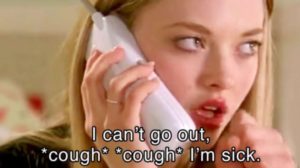Jonathon Woolfrey & Tammy Tansley in The Australian

‘Working with Covid’ is the new badge of honour.
Oh you’re sick? Just work from home.
Raise your hand if you’ve been working with Covid.
There is a certain sick honour that comes with dialling in after testing positive.
You log onto your morning Zoom from bed, nose scabbed red, and hit the mute button just in time for every second sneeze. Everyone fusses over your affliction and comments on your perseverance.
It’s become a laudable workplace trait in a new world – one where a ‘strong immune system’ is social currency.
The pandemic has changed the how we take sick days.
Unless you’re violently ill or in a gig that requires your physical presence (shout out to our wonderful nurses, teachers and truck drivers!), you can likely work from home or work flexibly.
Even if that means working at 75% capacity, putting in two hours on, two hours off, or having a nap at 2pm.
“The organisations I’ve worked with find that people are using a lot less sick days than they used to. [We are likely] working while sick with Covid or another virus,” HR specialist and managing partner at Talenting Jonathan Woolfrey told The Oz.
“There is a concern that reducing our use of sick leave means people aren’t taking the time they need to recover from the virus or a cold or otherwise … It will have a real impact on burnout for certain people as we go forward.”
Since Covid symptom severity ranges from ‘my-heads-about-to-fall-off’ to ‘it’s-just-a-cold’, it’s up to the employees to decide whether they should call in sick, as well as how much time they need to fully recover.
If people aren’t taking the time they need to fully recover from their illness, it could lead to burnout, leadership and workplace culture expert Tammy Tansley said.
“Covid can be really serious for some people, but it’s almost like, look, everyone’s got it. Just keep going. Keep working … There’s been a real shift in that,” she said.
And don’t forget to compare yourself to your colleague Jane, who just had Covid. She was terribly sick and she didn’t take a single day off! Nigel from marketing needed an IV but still made the 9am WIP.
Both Tansley and Woolfrey said the pandemic and working from home has also entrenched in us this mentality of being “always on”.
“We (are now given so) much more flexibility … there is this kind of expectation that we should be on all the time and that if our boss texts us at 6.30am in the morning or we get a Slack message at 11 o’clock at night, that because we’ve got the flexibility we should be giving it back to our employer as well,” Tansley said.
“We are finding that post-pandemic or while we’re still in it, burnout has become a real issue because you’re never off.”
Then there’s the guilt.
The deep, almost Catholic-guilt, that you’re letting your team down or have too much to do.
It’s true, we are busier now than pre-pandemic for a number of reasons. This includes huge numbers of unfilled positions due to record low unemployment and Covid forcing people off the job.
“Workplaces are so busy at the moment, you want to show colleagues you’re getting work done,” Woolfrey said.
So should you take a sick day or two if you’re ill with Covid?
Turn on the OOO message even when you’re WFH?
Probably.
